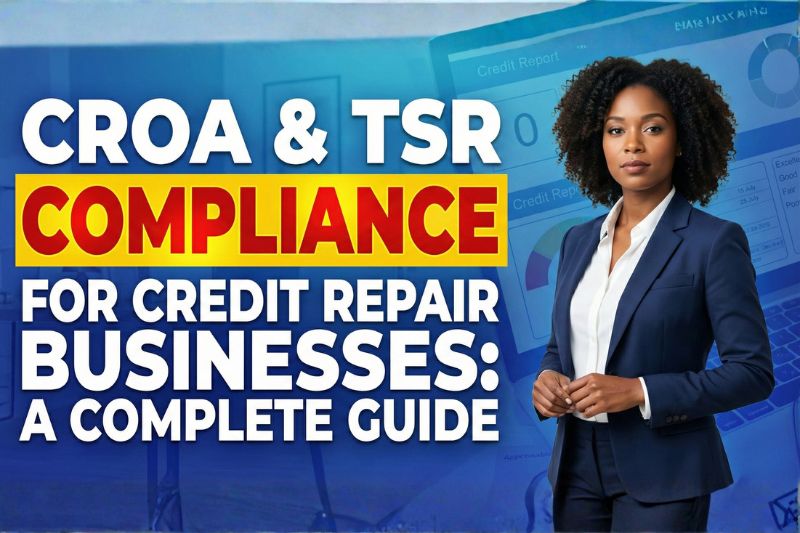Are you ready to launch your credit repair business but feeling overwhelmed by the maze of credit repair laws? You’re not alone. Navigating the complex world of credit repair legal requirements can be daunting, but it’s crucial for your success. Two key players in this legal landscape are the Credit Repair Organizations Act (CROA) and the Telemarketing Sales Rule (TSR).
These credit repair business laws are your roadmap to running an ethical, compliant, and thriving credit repair business. In this comprehensive guide, we’ll demystify credit repair compliance, helping you avoid common pitfalls and build a rock-solid foundation for your business.
Start Today and Explore the Features Firsthand!
Understanding Credit Repair Laws: CROA and TSR
Credit repair laws form the foundation of ethical practices in the industry. The two primary federal regulations, CROA and TSR, set stringent guidelines for credit repair businesses. Understanding these credit repair legal requirements is essential for maintaining compliance and protecting both your business and your clients.
Credit Repair Organizations Act (CROA)
The Credit Repair Organizations Act, a cornerstone of credit repair laws, was enacted by Congress in 1996 as part of the Consumer Credit Protection Act. Its primary purpose is to ensure that credit repair organizations operate transparently and ethically, protecting consumers from unfair or deceptive practices in the credit repair industry.
CROA regulations were created in response to growing concerns about fraudulent credit repair companies taking advantage of consumers struggling with poor credit. The Act establishes a clear set of rules and guidelines that credit repair organizations must follow, ensuring that consumers have access to accurate information about their rights and the services being offered.
Key Provisions of CROA Regulations
The CROA regulations set forth a comprehensive framework of legal requirements for credit repair businesses. These provisions are designed to ensure transparency, protect consumer rights, and maintain ethical standards within the industry.
Understanding and implementing these key provisions is crucial for any credit repair business aiming to operate legally and build trust with clients. Let’s delve into the specific requirements that form the cornerstone of CROA compliance.
Disclosure Requirements
One of the fundamental aspects of CROA compliance is its emphasis on transparency through mandatory disclosures. As a credit repair business, you must provide your clients with specific information before any contract is signed or payment is made.
- Written Contracts: CROA requires that all agreements between credit repair organizations and consumers must be in writing. This written contract must include:
The terms and conditions of payment
A detailed description of the services to be performed
An estimate of how long it will take to achieve the results
Any guarantees offered by the credit repair organization
- Consumer Rights Statement: Before executing a contract, you must provide a separate document titled “Consumer Credit File Rights Under State and Federal Law.” This statement informs consumers of their right to dispute inaccurate information in their credit reports directly with credit bureaus at no cost.
Start Today and Explore the Features Firsthand!
Prohibited Practices
CROA outlines several practices that credit repair organizations are explicitly forbidden from engaging in:
- Misrepresentation: You cannot make any false or misleading statements about your services or their effectiveness. This includes overpromising results or guaranteeing the removal of accurate negative information from credit reports.
- Advance Payments: CROA prohibits credit repair organizations from requesting or receiving any money or other valuable consideration for services before those services are fully performed. This means you cannot charge upfront fees for your services.
- Non-waivable Rights: The Act stipulates that consumers cannot waive any of the protections provided by CROA. Any attempt to have a consumer waive these rights is considered void and unenforceable.
Consumer Protections
CROA provides several important protections for consumers:
- Right to Cancel: Consumers have the right to cancel any contract with a credit repair organization without penalty within three business days from the date the contract was signed. You must inform clients of this right and provide them with a cancellation form.
- Legal Recourse: If a credit repair organization violates CROA, consumers have the right to sue for actual damages or the amount paid to the organization, whichever is greater. They may also seek punitive damages and attorney’s fees.
Telemarketing Sales Rule (TSR)

The Telemarketing Sales Rule, another crucial component of credit repair laws, is enforced by the Federal Trade Commission (FTC). It was implemented in 1995 and significantly amended in 2003 and 2010. While not specific to credit repair, the TSR applies to all businesses that engage in telemarketing, including credit repair organizations that use phone calls to market their services.
The primary purpose of the TSR is to protect consumers from deceptive and abusive telemarketing practices. It sets standards for telemarketing calls, restricts certain practices, and provides consumers with specific rights when dealing with telemarketers.
Key Provisions for TSR Compliance
The Telemarketing Sales Rule compliance requirements encompass a wide range of practices that credit repair businesses must adhere to when engaging in telemarketing activities. These provisions are intended to protect consumers from deceptive or abusive telemarketing practices and ensure fair business conduct.
For credit repair businesses, understanding and implementing these TSR compliance measures is essential not only for legal operation but also for building a reputable and trustworthy brand in the industry.
Disclosure Requirements
The TSR mandates that telemarketers provide specific information to consumers:
- Initial Disclosures: At the beginning of the call, telemarketers must promptly disclose:
- The identity of the seller
- That the purpose of the call is to sell goods or services
- The nature of the goods or services being offered
- The identity of the seller
- Verifiable Authorization: For certain types of payments, including credit card charges, the TSR requires express verifiable authorization from the consumer. This can be in the form of written authorization, audio recording of verbal consent, or confirmation through an independent third party.
Record Keeping Requirements
The TSR requires telemarketers to maintain certain records for 24 months from the date the record is produced. These include:
- Advertising materials
- Written agreements with customers
- Names and last known addresses of employees directly involved in telephone sales
- All verifiable authorizations or records of express informed consent or express agreement
- A list of telephone numbers the telemarketer has called
Start Today and Explore the Features Firsthand!
Do Not Call Provisions

The TSR includes provisions related to the National Do Not Call Registry:
- Registry Compliance: Telemarketers must check the National Do Not Call Registry every 31 days and not call any phone number on the registry.
- Company-Specific Do Not Call Lists: In addition to the national registry, companies must maintain their own do not call lists for consumers who specifically ask not to be called by that company.
- Established Business Relationship Exception: Telemarketers may call consumers with whom they have an established business relationship, even if the consumer’s number is on the National Do Not Call Registry. However, if a consumer asks a company with which they have an established business relationship not to call again, the company must honor that request.
Common Mistakes That Violate Credit Repair Laws
Even with the best intentions, credit repair businesses can inadvertently violate credit repair laws. Awareness of common pitfalls is crucial for maintaining credit repair compliance. This section outlines frequent mistakes related to both CROA regulations and TSR compliance.
Credit Repair Organizations Act (CROA) Violations
Credit repair businesses often violate CROA regulations by charging clients before services are fully performed, such as requiring setup fees or charging monthly fees in advance. Another common mistake is failing to provide comprehensive written contracts that include a full description of services, total costs, timeframes, and any guarantees. Misrepresenting services or results, like guaranteeing the removal of all negative items or promising specific credit score increases, is a serious violation of credit repair laws.
Neglecting to provide the required Consumer Rights Disclosure or attempting to waive consumer rights also contravenes CROA. These violations can result in severe penalties, including fines and potential closure of the business. To ensure CROA compliance, credit repair organizations must be vigilant in their practices and regularly review their procedures against the Act’s requirements.
Telemarketing Sales Rule (TSR) Violations
Telemarketing Sales Rule (TSR) compliance is often compromised when credit repair businesses fail to adhere to Do Not Call provisions, such as not scrubbing calling lists against the National Do Not Call Registry or calling outside permitted hours. Inadequate recordkeeping is another frequent issue, as the TSR requires specific records to be kept for 24 months.
Providing incomplete disclosures during calls, such as failing to promptly identify the seller or the purpose of the call, violates TSR regulations. Misrepresenting services during calls and charging advance fees for credit repair services are serious infractions that can lead to significant penalties.
Credit repair organizations must implement robust systems to ensure TSR compliance, including regular training for staff involved in telemarketing activities and thorough audits of their practices.
Implications for Your Credit Repair Business: Ensuring Compliance

To ensure compliance with credit repair laws, including CROA regulations and TSR compliance, and avoid common mistakes, consider implementing the following strategies:
- Training and Education: Regularly train your staff on credit repair legal requirements, including CROA and TSR. Make sure they understand the importance of compliance and the potential consequences of violations.
- Develop Compliant Documents: Create clear, compliant contracts and disclosure statements that meet all CROA requirements. Have these documents reviewed by a legal professional familiar with credit repair laws.
- Ethical Payment Models: Structure your payment model to avoid any appearance of charging advance fees. Consider performance-based pricing models that align with CROA and TSR requirements.
- Robust Recordkeeping: Implement a comprehensive system for maintaining all required records. This includes client agreements, marketing materials, and telemarketing call records.
- Internal Audits: Conduct regular internal audits to ensure ongoing compliance with credit repair business laws. This can help identify and correct any issues before they become serious problems.
- Use Compliant Software: Utilize software solutions designed to help credit repair businesses maintain compliance with relevant credit repair laws and regulations.
- Implement a Robust Compliance Program: Develop a comprehensive compliance program that addresses all aspects of credit repair laws, including CROA regulations and TSR compliance. This should include regular staff training, internal audits, and a system for staying updated on regulatory changes.
- Consult with Legal Professionals: Regularly consult with attorneys who specialize in credit repair laws. They can review your contracts, marketing materials, and business practices to ensure compliance with credit repair legal requirements.
- Develop Clear Policies and Procedures: Create and enforce clear, written policies that address each aspect of credit repair compliance. Make sure all employees understand and follow these policies.
- Foster a Culture of Compliance: Emphasize the importance of compliance with credit repair laws throughout your organization. Make it clear that following credit repair business laws is a non-negotiable part of your business operations.
Frequently Asked Questions (FAQs)
What Are The Most Critical Aspects Of Credit Repair Laws That Businesses Must Comply With?
The key aspects of credit repair laws include:
- No advance fees: Don’t charge before services are completed.
- Written contracts: All agreements must be in writing with detailed service descriptions.
- Required disclosures: Provide a “Consumer Credit File Rights” document before contracts are signed.
- Truthful advertising: Avoid false or misleading claims about services or results.
- Telemarketing compliance: Follow do-not-call lists, calling time restrictions, and disclosure requirements.
Violating these credit repair legal requirements can result in fines and potential business shutdown. Regular compliance audits are crucial.
Start Today and Explore the Features Firsthand!
What Specific Records Do I Need To Maintain To Comply With Telemarketing Sales Rule (TSR), And For How Long?
To maintain TSR compliance, keep the following records for 24 months:
- Advertising materials (including telemarketing scripts)
- Customer information and agreements
- Employee records involved in telephone sales
- Payment records
- Compliance documentation (e.g., do-not-call list management)
Implement a digital record-keeping system and conduct regular audits to ensure compliance with credit repair laws.
How Do State-Specific Laws Interact With Federal Credit Repair Laws Like CROA And TSR?
State laws can be more stringent than federal credit repair laws. To ensure compliance:
- Research credit repair legal requirements in each state where you operate
- Consult with a lawyer familiar with credit repair laws in your operating states
- Create a compliance matrix for each jurisdiction
- Regularly monitor for changes in credit repair business laws at federal and state levels
- Consider using geo-fencing in your operations for state-specific compliance
When federal and state credit repair laws differ, follow the stricter standard.
Conclusion
Understanding and complying with credit repair laws, particularly CROA regulations and TSR compliance, is crucial for the success and longevity of your credit repair business. These credit repair legal requirements, while complex, serve an important purpose in protecting consumers and maintaining the integrity of the credit repair industry.
By prioritizing credit repair compliance, you not only avoid potential legal issues but also build a reputation for trustworthiness and professionalism, setting your business apart in a competitive market.
Remember that compliance with credit repair laws is an ongoing process. Stay informed about changes in credit repair business laws, regularly review your practices, and don’t hesitate to seek professional legal advice when needed. Utilize tools designed to streamline your compliance efforts with credit repair laws and focus on what you do best helping your clients improve their credit.
By embracing these principles and avoiding common compliance pitfalls, you can build a successful business that makes a positive impact on your clients and the broader community.

Mark Clayborne
Mark Clayborne specializes in credit repair, starting and running credit repair businesses. He's passionate about helping businesses gain freedom from their 9-5 and live the life they really want. You can follow him on YouTube.
Start Today and Explore the Features Firsthand!
Below Is More Content For Your Review:


